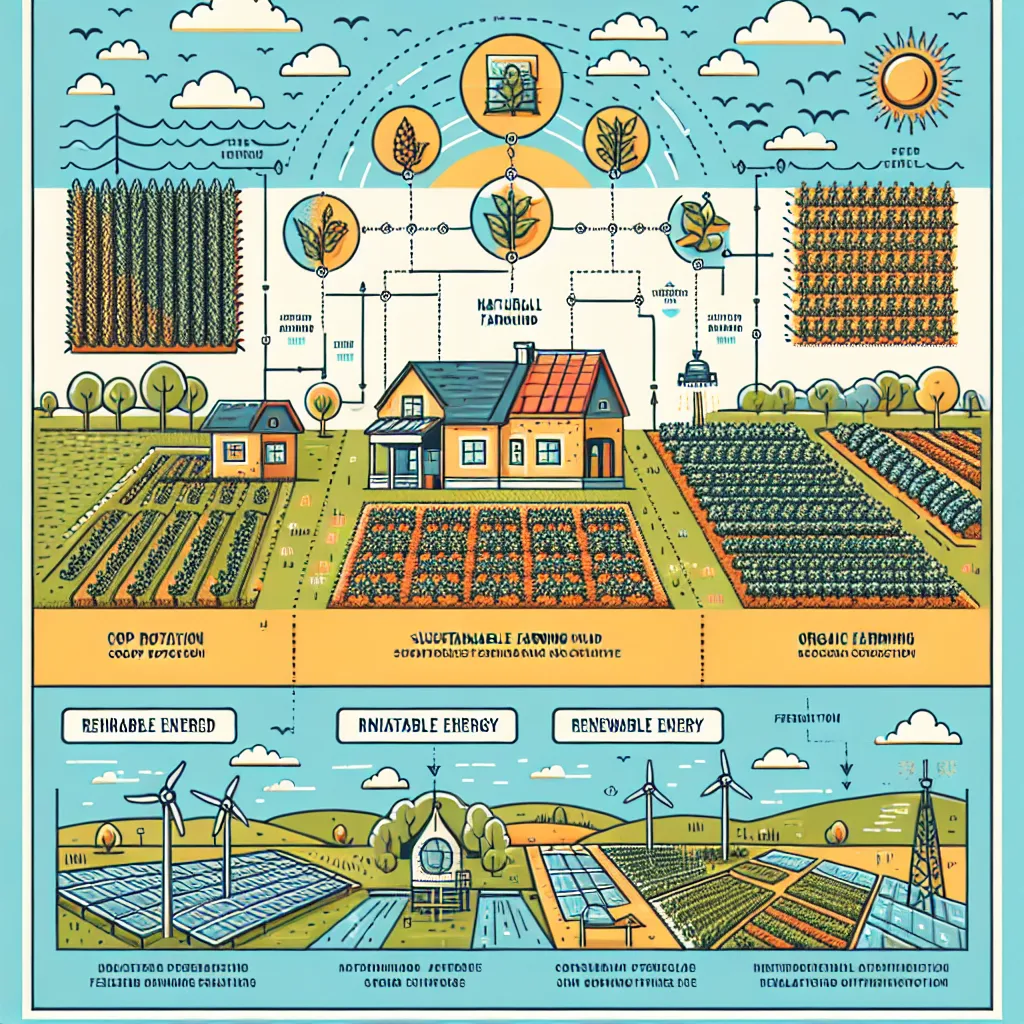Welcome to our IELTS Reading practice session focused on the topic of sustainable agriculture. The IELTS Reading section is a crucial part of the exam, testing your ability to comprehend complex texts and answer various question types. Today, we’ll be exploring a passage on “How to Support Sustainable Agriculture,” a subject that has been increasingly prevalent in recent IELTS exams.
Based on our analysis of past IELTS tests and current global trends, sustainability in agriculture is a highly relevant topic. It has appeared in various forms over the years, and given its growing importance in addressing climate change and food security, we predict it will continue to be a popular subject in future IELTS exams.
Let’s dive into a practice passage and questions that mirror the style and difficulty you might encounter in the actual IELTS Reading test.
 Sustainable Agriculture Practices
Sustainable Agriculture Practices
Reading Passage
Fostering Sustainable Agriculture: A Global Imperative
Sustainable agriculture has become a pressing concern in the 21st century as the world grapples with climate change, population growth, and resource depletion. This agricultural approach aims to meet society’s present food and textile needs without compromising the ability of future generations to meet their own needs. Supporting sustainable agriculture is crucial for ensuring long-term food security, preserving biodiversity, and mitigating environmental degradation.
One key way to support sustainable agriculture is through the adoption of conservation tillage practices. This method minimizes soil disturbance, thereby reducing erosion and preserving soil structure. By leaving crop residues on the field, conservation tillage also helps retain soil moisture and organic matter, leading to improved soil health over time. Farmers who implement these practices often report increased crop yields and reduced production costs, making it an economically viable option.
Another vital aspect of sustainable agriculture is the efficient use of water resources. Drip irrigation systems, for instance, deliver water directly to plant roots, significantly reducing water waste compared to traditional flood irrigation methods. Additionally, rainwater harvesting techniques can help farmers collect and store water for use during dry periods, decreasing reliance on groundwater sources.
Integrated pest management (IPM) is another cornerstone of sustainable agriculture. This approach combines biological, cultural, physical, and chemical tools to manage pests while minimizing economic, health, and environmental risks. IPM strategies include crop rotation to disrupt pest life cycles, the use of pest-resistant crop varieties, and the introduction of natural predators to control pest populations. By reducing reliance on chemical pesticides, IPM helps preserve beneficial insects and protect ecosystem balance.
Promoting biodiversity is essential for sustainable agriculture. Polyculture, the practice of growing multiple crop species in the same field, can enhance soil fertility, reduce pest pressures, and increase overall farm productivity. Additionally, maintaining hedgerows and natural habitats around farmland provides shelter for beneficial insects and wildlife, contributing to natural pest control and pollination services.
Supporting local and small-scale farmers is crucial for advancing sustainable agriculture. These farmers often have deep knowledge of local ecosystems and traditional farming practices that can be integrated with modern sustainable techniques. Governments and organizations can support these farmers through education programs, access to sustainable technologies, and fair market opportunities.
Consumer choices play a significant role in supporting sustainable agriculture. By opting for locally grown, organic, or sustainably produced foods, consumers can create demand for environmentally friendly farming practices. Additionally, reducing food waste at home and supporting community-supported agriculture (CSA) programs can help create a more sustainable food system.
Research and innovation are vital for the continued development of sustainable agricultural practices. Investments in agricultural research can lead to the development of drought-resistant crop varieties, more efficient irrigation systems, and improved soil management techniques. Encouraging collaboration between scientists, farmers, and policymakers can accelerate the adoption of innovative sustainable practices.
In conclusion, supporting sustainable agriculture requires a multifaceted approach involving farmers, consumers, researchers, and policymakers. By implementing conservation practices, promoting biodiversity, supporting local farmers, making conscious consumer choices, and investing in research, we can foster a more sustainable and resilient agricultural system for future generations.
Questions
True/False/Not Given
For questions 1-5, please indicate whether the statements are True, False, or Not Given according to the information provided in the passage.
- Conservation tillage always results in higher crop yields compared to traditional methods.
- Drip irrigation systems are more water-efficient than flood irrigation methods.
- Integrated pest management relies solely on biological pest control methods.
- Polyculture can help improve soil fertility and reduce pest problems.
- All small-scale farmers use traditional farming practices exclusively.
Matching Headings
Match the following headings to the correct paragraphs in the passage. Write the correct number (i-viii) next to questions 6-10.
i. The role of research in advancing sustainable agriculture
ii. Water management strategies for sustainable farming
iii. The importance of supporting local agricultural communities
iv. Integrated approaches to pest control in sustainable agriculture
v. Conservation tillage as a sustainable farming practice
vi. The significance of biodiversity in agricultural sustainability
vii. Consumer impact on sustainable agriculture
viii. Defining sustainable agriculture and its importance
- Paragraph 2: ____
- Paragraph 3: ____
- Paragraph 4: ____
- Paragraph 5: ____
- Paragraph 7: ____
Summary Completion
Complete the summary below using words from the box. Write your answers in boxes 11-14.
A) ecosystem
B) erosion
C) organic matter
D) water waste
E) crop rotation
F) chemical pesticides
G) polyculture
H) hedgerows
Supporting sustainable agriculture involves various practices. Conservation tillage helps reduce soil (11)__ and preserve (12)__. Efficient irrigation systems minimize (13)__. Integrated pest management uses strategies like (14)__ to control pests while reducing reliance on harmful chemicals.
Answer Key and Explanations
True/False/Not Given
- False – The passage states that farmers “often report increased crop yields,” not always.
- True – The text explicitly states that drip irrigation systems “significantly reduc[e] water waste compared to traditional flood irrigation methods.”
- False – The passage mentions that IPM “combines biological, cultural, physical, and chemical tools.”
- True – The text states that polyculture “can enhance soil fertility, reduce pest pressures, and increase overall farm productivity.”
- Not Given – The passage does not provide information about whether all small-scale farmers exclusively use traditional practices.
Matching Headings
- v – This paragraph discusses conservation tillage as a sustainable farming practice.
- ii – This paragraph focuses on water management strategies in sustainable agriculture.
- iv – This paragraph explains integrated pest management approaches.
- vi – This paragraph emphasizes the importance of biodiversity in sustainable agriculture.
- vii – This paragraph discusses how consumer choices impact sustainable agriculture.
Summary Completion
- B – erosion
- C – organic matter
- D – water waste
- E – crop rotation
Common Mistakes to Avoid
- Overlooking key words: Pay attention to qualifiers like “always,” “often,” or “some” in True/False/Not Given questions.
- Misinterpreting “Not Given”: Remember, this option means the information is not provided in the text, not that it’s false.
- Relying on prior knowledge: Base your answers solely on the information given in the passage.
- Rushing through the passage: Take time to understand the main idea of each paragraph for matching headings questions.
- Ignoring context: For summary completion, ensure your chosen words fit grammatically and logically in the sentence.
Vocabulary
- Sustainable: /səˈsteɪnəbəl/ (adjective) – able to be maintained at a certain rate or level
- Conservation tillage: /ˌkɒnsəˈveɪʃən ˈtɪlɪdʒ/ (noun) – farming methods that reduce soil erosion
- Biodiversity: /ˌbaɪəʊdaɪˈvɜːsəti/ (noun) – variety of plant and animal life in a particular habitat
- Integrated pest management: /ˈɪntɪɡreɪtɪd pest ˈmænɪdʒmənt/ (noun) – ecosystem-based strategy for pest control
- Polyculture: /ˈpɒlɪˌkʌltʃə/ (noun) – the simultaneous cultivation of several crops
Grammar Focus
Passive voice is frequently used in academic writing to emphasize actions rather than actors. For example:
“Conservation tillage practices are adopted to minimize soil disturbance.”
Structure: Subject + be + past participle
Practice: Transform these sentences into passive voice:
- Farmers implement sustainable practices.
- Researchers develop new irrigation systems.
Tips for High Scores in IELTS Reading
- Time management: Allocate your time wisely across all three passages.
- Skim and scan: Quickly identify main ideas and locate specific information.
- Read questions carefully: Understand what each question is asking before searching for answers.
- Use context clues: If you encounter unfamiliar words, try to deduce their meaning from the surrounding text.
- Practice regularly: Familiarize yourself with various question types and develop effective strategies.
Remember, success in IELTS Reading comes with consistent practice and strategic approach. Focus on improving your vocabulary, enhancing your reading speed, and developing critical thinking skills. For more insights on sustainable agriculture and its challenges, check out our articles on the importance of sustainable agriculture and challenges of sustainable agriculture.
Keep practicing, and you’ll see improvement in your reading skills and overall IELTS performance. Good luck with your preparation!


